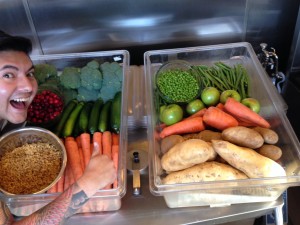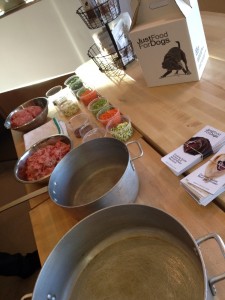This is probably one of the most common questions that we are asked as veterinarians. With so many people concerned about what they are putting into their own bodies today, more and more pet owners are also focusing on what they feed their dogs too. While there are certain health conditions that will require some pets to be on specific prescription diets, we do have general guidelines for answering this very common question.
First off, your pet has to like the diet and their digestive systems must agree with the food. No matter now organic or fresh the diet, if your dog won’t eat it, it’s not the right diet for him/her. Also if your pet loves a particular diet but vomits or has diarrhea whenever (s)he eats it, it’s also a no-go. Once you’ve found a diet that your dog likes and that treats their gastrointestinal system well, you’re ready for the next step.
Second, read the ingredients. Remember that ingredients are listed by quantity - the first listed ingredient is the most abundant in that diet. We prefer that the top 2-3 ingredients in the list be whole, real, recognizable foods. Turkey, deboned chicken, sweet potato… is a better list than corn meal, chicken by-product, meat… Some of these terms can be ambiguous, so let’s clarify.
- Meat: unidentified mammal tissue
- Byproduct: this term does not define what specific tissue is used in the final product. Byproduct could include good things like organ meat (heart, liver, etc.) or other more questionable tissues (like fat, bone, blood) not typically used as human foods in the United States. Byproduct does not include things like horn, hooves or hair.
- Meal: this term simply refers to any ingredient that has been ground or otherwise reduced in particle size.
Concerned owners should avoid feeding diets listed with generic descriptions of meats or animal byproducts in favor of diets with specific meats listed.
Lastly freshness is ideal. The longer your pet’s food a has been sitting around, the more likely you are to find preservatives and other stabilizers in the diet.
But please don’t misunderstand us. We are by no means saying that kibble and canned foods are unhealthy. However if the question is “what is the best food I can feed my dog?”, we would tell you that it is one your pet likes, one that agrees with your pet’s gut and one that is made with real, fresh, whole ingredients.
Enter home-cooked diets! Especially when the source and quality of the ingredients are a concern, home-cooked diets are very appropriate. Veterinarians used to worry that even with whole, fresh ingredients going into a home-cooked diet, the end product was still not 100% nutritionally balanced in regards to vitamins and minerals.
DTLAvets works with an innovative company called Just Food For Dogs, whose philosophy regarding pet food is right in line with our own. But they have solved the problem of mineral and vitamin deficiencies with their easy to follow home-cooked diets and their DIY nutritional blend packets. Developed with a veterinarian, each of their 5 published recipes (www.justfoodfordogs.com) is coupled with a unique nutritional powder blend that rounds out that particular diet and makes it 100% nutritionally sound for dogs. So delicious are their diets that we went to their flagship store in West Hollywood last week for a cooking class and “tasting” (read: we brought our own wine for the food pairings!)
The truth? This stuff looks and tastes better than any microwave meal I’ve ever seen.
Bon appetit!


